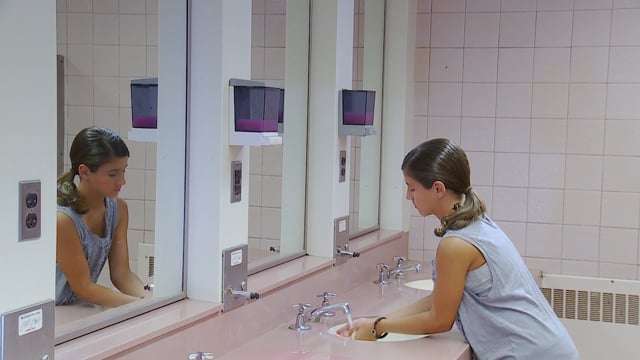Fighting Germs
What Are Germs?
The term "germs" refers to the microscopic bacteria, viruses, fungi, and protozoa that can cause disease.
Washing hands well and often is the best way to prevent germs from leading to infections and sickness.
What Problems Can Germs Cause?
When germs invade the body, they get ready to stay for a while. These germs draw all their energy from the host. They may damage or destroy healthy cells. As they use up your nutrients and energy, they may make proteins known as toxins, which can help the germ in its mission to destroy.
Germs also activate the immune system, the network of cells, tissues, and organs that work together to protect the body. Our immune system sends out white blood cells, antibodies, and other chemicals to rid the body of the invading germs.
The germs, the toxins, and the immune system processes all can lead to the annoying symptoms of a cold or flu-like infections, such as sniffles, sneezing, coughing, and diarrhea. They also can cause a high fever, increased heart rate, low blood pressure, an inflammatory response in the body, and even life-threatening illness.
How Can We Protect Ourselves From Germs?
Most germs spread through the air in sneezes or coughs or through body fluids like sweat, saliva (spit), semen, vaginal fluid, or blood. So limiting contact with them, when possible, is the best protection against germs.
Remember to:
- Wash your hands.
- Avoid being near people who are sick. If you are sick, stay home.
- Try not to touch your eyes, nose, and mouth.
- If you sneeze or cough, cover your mouth and nose with a tissue, and then throw it out. If you don't have a tissue, sneeze or cough into your elbow, not your hands.
Hand Washing
Making sure everyone in your family washes their hands well and often is the best way to stop germs from causing sickness. It's especially important to wash hands:
- after coughing or nose blowing
- after using the bathroom
- before preparing or eating food
- after touching pets or animals
- after gardening
- before and after visiting a sick relative or friend
There's a right way to wash your hands:
- Use water (warm or cold) and plenty of soap.
- Rub your hands together for at least 20 seconds (away from the water). Kids can sing a short song — try "Happy Birthday," twice — to make sure they spend enough time washing.
- Rinse your hands.
- Dry your hands well on a clean towel or air dry them.
If soap and water aren't available, use hand sanitizer with at least 60% alcohol. Rub hands together until the sanitizer dries. This should take about 20 seconds.
Food and Kitchen Safety
When working in the kitchen, wash your hands before you eat or prepare food, and make sure that kids do the same. Use proper food-handling techniques, such as:
- using separate cutting boards, utensils, and towels for preparing uncooked meat and poultry
- using warm, soapy water to clean utensils and counters
Cleaning Surfaces
Cleaning household surfaces well is also important. Wipe down objects around the house that get touched a lot, such as toys, doorknobs, light switches, sink fixtures, and flushing handles on toilets.
Soap and water are fine for cleaning. It's generally safe to use any cleaning agent that's sold in stores. But avoid using different cleaners or chemical sprays together because the mix of chemicals can irritate skin and eyes.
You can use household bleach for disinfecting, but always follow the package instructions when using bleach products.
Safe Sex
Teens who are sexually active should use condoms to help prevent infection because germs like viruses, bacteria, fungi, and protozoa can spread via oral, anal, or vaginal contact.
Vaccines
Another way to prevent infections from germs is to make sure your family has the right immunizations (or vaccines), which prepare the body to fight illness. Vaccines contain either a dead or a weakened germ (or parts of it) that causes a particular disease. When someone gets a vaccine, their immune system acts as if there's a real infection. It makes antibodies that recognize parts of that germ. So if that germ enters the body later, the antibodies are in place and the body knows how to fight the infection so the person won't get sick.

How to Clean Your Hands
You know that cleaning your hands is the best way to stop the spread of germs, but what’s the right way to wash your hands and use hand sanitizer?


